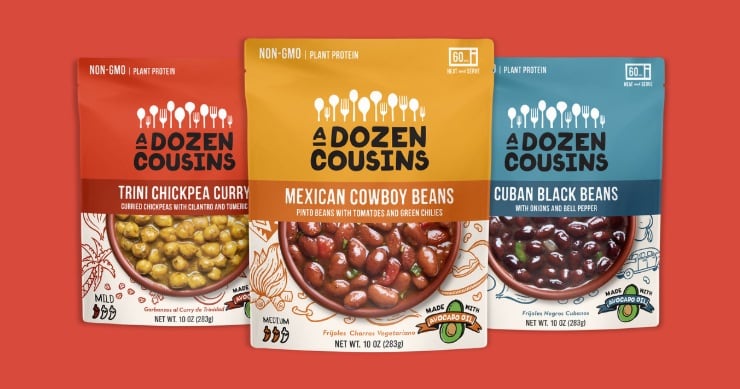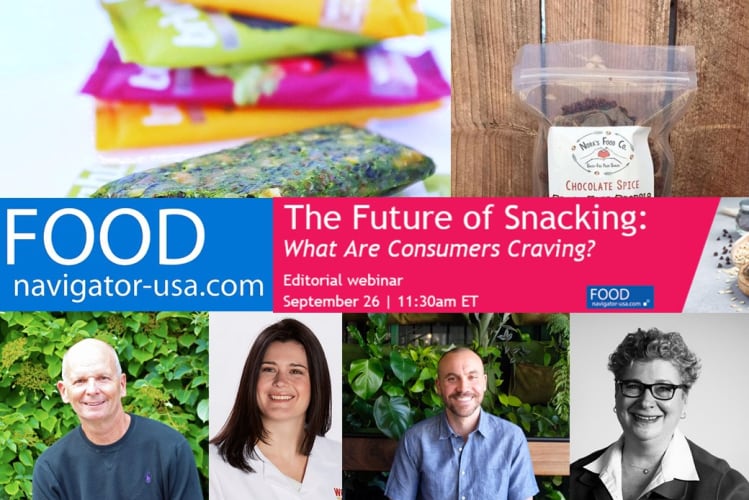At Expo East this fall, Ibraheem Basir will unveil A Dozen Cousins’ first line of ready-to-eat beans that are based on regional Black and Latino recipes that reflect his mother’s Southern Creole cooking and the Caribbean and Latin American food of his childhood neighbors in Brooklyn.
A notable difference between the recipes used during his childhood and those of A Dozen Cousins is that the brand’s Cuban Black Beans, Mexican Cowboy Beans and Trini Chickpea Curry will be slow simmered in avocado oil rather than canola or another conventional option, Basir said. He explained that the on-trend, premium ingredients in his products will deliver more nutrients than more traditional options, but without sacrificing the flavor – and fun – of the original dishes.
Why beans?
The inspiration for the brand and trio of beans came to Basir when he found himself pulled between eating the fresh, leafy greens everyone today aspires to eat and the food he grew up eating, which wasn’t always healthy.
“This made me reflect and realize there was an opportunity to create a natural food brand that speaks to people like me. People for whom food is really about joy, culture and connecting with family, and less about athletics or performance or heavy nutrition,” but who still want to eat well, he said.
To do this, Basir said he knew that he needed to pick a product that tasted indulgent, had “really good health credentials and also really high cultural taste – and beans, obviously, checked all three of those boxes.”
He acknowledged that for many people beans might seem “kind of like a commodity or a boring food product,” but for him they were an indulgent, culturally relevant treat because he remembers his mother undertaking a two-day process of soaking the beans, blending them with seasons and simmering them on low all day.
He also recognized that in today’s on-the-go environment, not many people have the time or patience to dedicate two days to cooking a dish, which is why he wanted to bring “some of the energy, fun and excitement that a lot of ethnic consumers have towards beans and bring it to the packaged section.”
The convenience of his line gives his beans an edge over dry beans, which also are healthy and can be blended with premium ingredients.
But it isn’t just dry beans that Basir says A Dozen Cousins tops – the brand’s beans also are better than canned and other ready-to-eat varieties, he claims.
“Many traditional canned beans still use BPA in the cans, and that is obviously not something consumers want. And secondary to that is the fact that those products still require additional prep. You can buy a can of beans, but you still need to season and finish cooking them,” he said.
As for other ready-to-eat options, Basir says there hasn’t been much innovation or evolution in terms of flavor.
“If you think about it, for example, consumers are wanting more nutrient dense oils, like coconut and avocado oils. And other brands use canola or corn oil. So there are not other beans that offer that, and we do,” he said. “We also use real onions, real garlic, apple cider vinegar and really push it in terms of ingredient quality.”
Drawing on lessons learned at General Mills
Starting a business – even one with relevance and strong points of differentiation from the competition – isn’t easy, and Basir knows from experience that many new products don’t last. But he also knows from his time helping emerging brands and working on product innovation at General Mills what it takes to succeed.
“First of all, starting any business is hard. And most new businesses fail. But to succeed I think you need to have a strong enough mission that you are going after and that consumers will get, and I think I have that,” Basir said.
In addition, he said, he learned at General Mills how to listen to consumers and really provide solutions to pain points – another factor that can heavily influence success.
“In my time at General Mills, I became really good at listening to people and understanding what are their actual problems. What are the attributes of the product that can deliver solutions to those problems and what are the brand attributes that speak to those same problems consumers are experiencing,” he said.
“We are building a brand around a very specific problem, which is eating certain types of food and not wanting to make a trade off and buy either cultural brands that are still really unhealthy, or buying natural brands that don’t necessarily have the same authentic flavors. Or you have to cook from scratch, which is really time consuming,” he said.
“All of those options have suboptimal outcomes for consumers, and my hope is we are creating a brand that eliminates that pain point and answers the question of how to eat something that is cultural and healthy,” he added.
Beyond that, Basir said he is primed for success because at General Mills he learned how to manage the everyday logistics and unknowns that can pop up – such as needing a minimum order for a co-packer or figuring out packaging problems.
He explained: “I had a chance to bump my head as a general manager at General Mills, so hopefully some of those lessons will pay off and I won’t make those same mistakes again.”
A platform designed for growth
Armed with these lessons, Basir is ready to take A Dozen Cousins all the way.
Beans are just the beginning, but the “brand will be much bigger than that,” he said, noting: “I see ourselves as a real brand that can be a solution to consumers who want convenient, simple meals that are culturally authentic. So, although we are starting here, I think we will extend to culturally relevant and authentic products in other categories. We want to be known as the meal time solution.”


